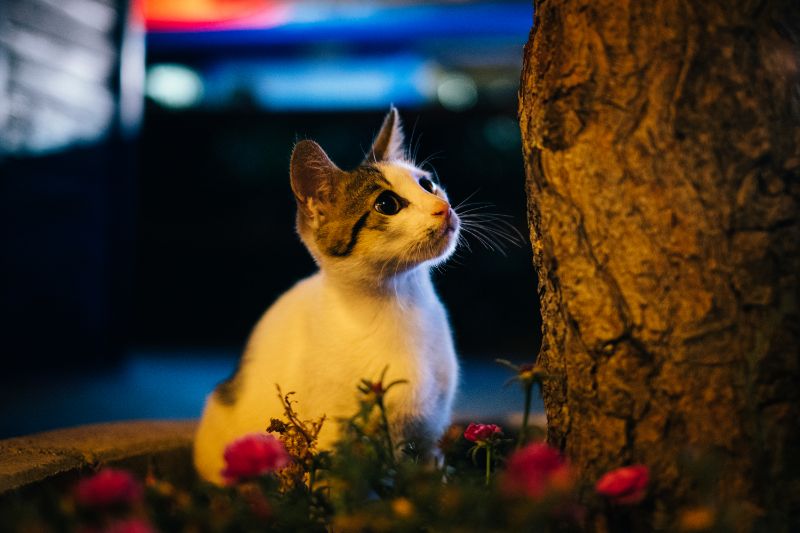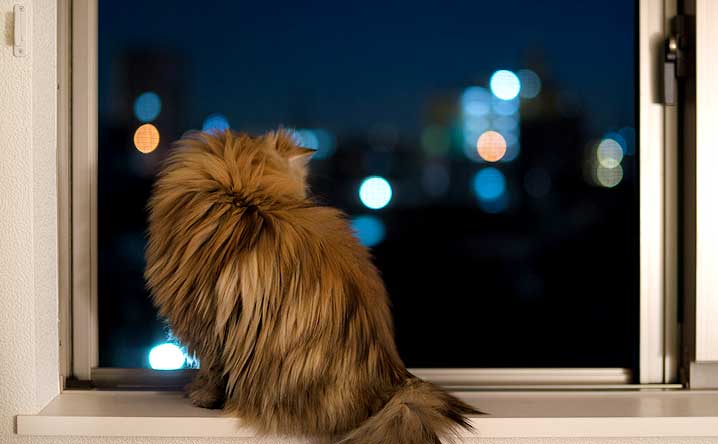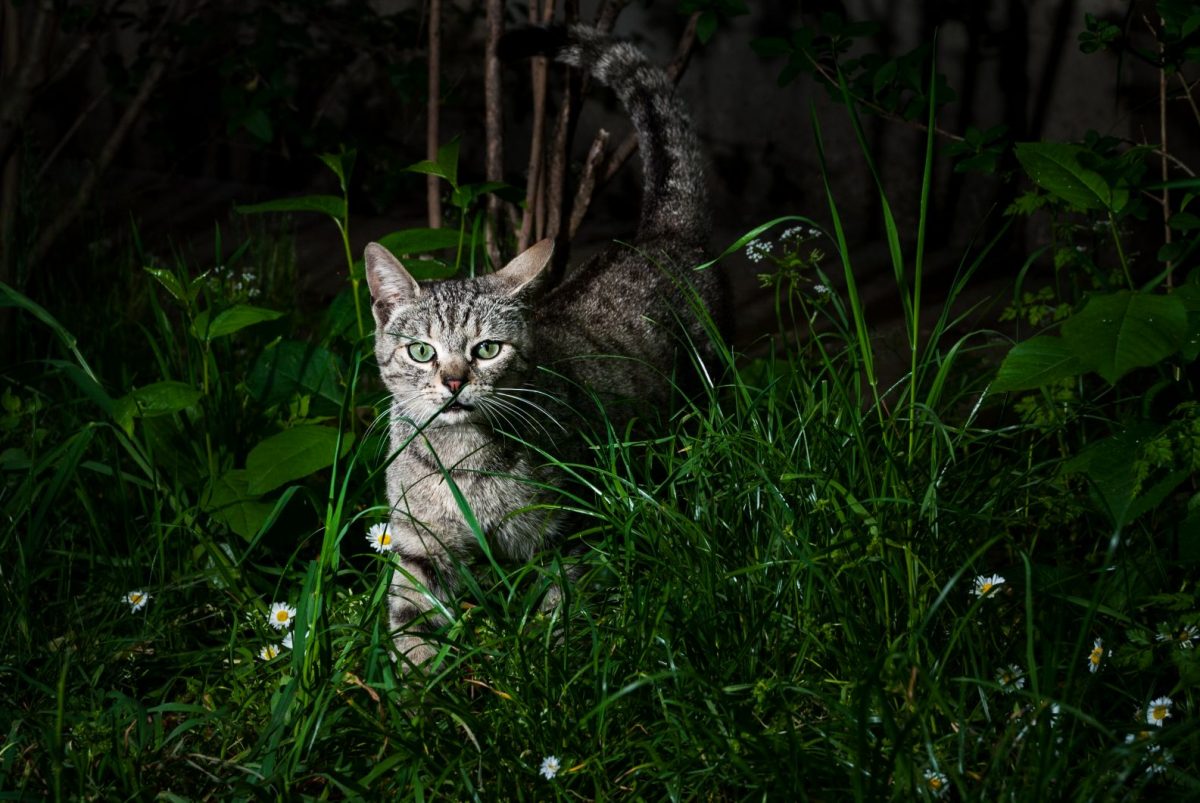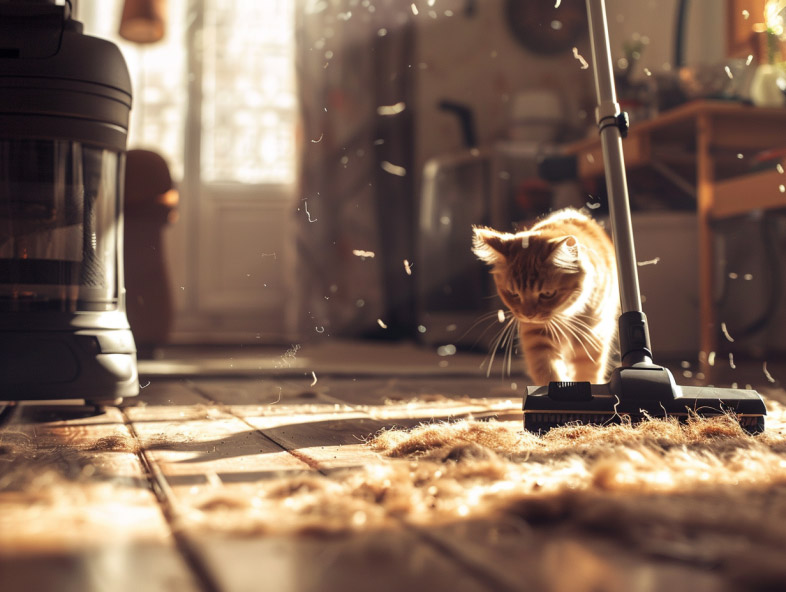Cats go out at night for reasons like their natural instincts, genetics, weather changes, health issues, personal preferences, fears, and breeding seasons. It’s a mix of factors that makes them want to explore during nighttime hours.
However, in the quiet corners of the night, where moonlight casts its silvery glow, a mysterious transformation has begun to unfold in the life of our feline companions. Cats, those enigmatic creatures that have long shared our homes, have embarked on a nocturnal journey that takes them beyond the familiar confines of our hearths and into the shadows of the moonlit world outside.
Once creatures of habit, content to curl up by the fire or bask in patches of sunlight, many cats have now taken to staying out all night, leaving their human companions to wonder about the secrets they’ve woven into the tapestry of the dark.
Get to know more details about the factors

Nocturnal
Naturally, Some cats are nocturnal animals, preferring to be active at night. This behavior is deeply rooted in their instincts, even after years of evolution and domestication.
In addition, These cats have evolved features such as large eyes and keen hearing to aid their nighttime activities. Cats’ excellent night vision allows them to hunt effectively during quiet hours when rodents are also searching for food, creating a favorable hunting environment for them.
Genetic:
If your cat has started staying out all night, it could be influenced by their genetic predisposition. Cats are crepuscular animals, meaning they are most active during the early evening and dawn.
Further, this behavior is rooted in their genetics, as they have evolved to be more active during these times to hunt and explore. Your cat’s inclination to be out at night could be a result of their natural genetic instincts aligning with their preferred activity periods.
Cat’s Comfort in Darkness
Cats find comfort in the darkness due to their exceptional night vision. This advantage grants them a sense of control and security, as they can perceive their surroundings while remaining hidden from potential threats.
Their solitary nature and preference for personal space make the peacefulness of the night an ideal time for them. Unlike dogs, which are more social animals, cats often find solace in the solitude of the nighttime environment.
Nocturnal Influence of the Moon: A Controversial Connection
While some studies suggest a correlation between the lunar cycle and changes in cats’ behavior, the exact influence of the moon remains debated.Also, the idea that cats become hyperactive or restless during a full moon has garnered anecdotal evidence, but scientific consensus on this topic is still lacking.
The potential link between lunar cycles and animal behavior warrants further exploration and investigation.
Cats explore their territory at night.
Cats are natural explorers and territorial beings. The cover of darkness provides them with the perfect opportunity to roam their territory, scouting for potential food sources, safe hiding spots, and areas to mark as their own. The absence of heavy traffic and disturbances during the night enhances their sense of freedom and security as they venture around their surroundings.
Navigating Relationships with Other Pets
Cats’ individualistic tendencies can sometimes lead to strained relationships with other pets in the household. Cats may prefer their own company and seek personal space away from other animals, which can result in conflicts. Providing separate spaces for pets to retreat to and ensuring each animal’s comfort is crucial for maintaining a peaceful coexistence.
Breeding Season and Mating Behavior
Depending on the breeding season, cats may exhibit behaviors associated with mating. Female cats in heat may display restlessness and discomfort, while males could become more agitated, engaging in territorial disputes and displaying behaviors indicating their readiness to mate. Recognizing and addressing these behaviors is essential for both the well-being of the cats and the household’s harmony.
Health Conditions and Unusual Behaviors
In some cases, cats’ increased nighttime activity could indicate underlying health conditions such as pain, chronic illness, hyperthyroidism, anxiety, or dementia. If a cat displays erratic behaviors, seeking professional veterinary care is crucial to identify and address any health concerns.
Seasonal Shifts
Your cat’s preference for an outdoor nap could stem from the changing weather. If the room becomes uncomfortably warm due to the summer season or changes in temperature control, your cat might seek cooler surroundings outdoors for a more comfortable sleep.
Evolutionary Instincts: A Legacy of Vigilance
Unlike their more domesticated canine counterparts, cats retain some wild instincts. In their natural habitat, cats would frequently alter their sleeping spots to evade predators. This practice also aided in minimizing contact with pesky fleas and parasites, contributing to their overall health.
Fear
Cats are territorial creatures, and disruptions in their environment can affect their comfort. If new noises, roommates, or unfamiliar objects, like a malfunctioning heater, cause discomfort or anxiety, your cat might opt to sleep outside until the situation normalizes.
Quirky Personalities
Cats possess distinct personalities and quirks that influence their behavior. It’s possible that your cat’s sleeping preference is driven by personal idiosyncrasies. Whether it’s a newfound liking for a specific cushion, a fondness for a particular outdoor spot, or simply an inexplicable whim, cats often follow their unique inclinations.
Effectively Managing Your Cat’s Nighttime Activity: Proven Strategies
When your cat begins staying out all night, consider these practical approaches to address and understand their behavior:
Examine Health Factors: It’s prudent to consult your veterinarian to rule out any potential medical triggers, like pain or thyroid issues, before tackling behavioral aspects. This ensures a comprehensive understanding of your cat’s situation.
Gradual Schedule Adjustments: Modifying your cat’s schedule can be a helpful tactic. Encourage play and feeding during daytime and early evening hours, gradually aligning their routine with the household’s schedule. This behavioral technique can shift your cat’s active period.
Feeding Techniques: Timing of meals can influence sleep patterns. Opt for smaller, more frequent meals and adjust the timing of evening meals. Feeding earlier in the evening and closer to bedtime can discourage nighttime hunger disruptions.For mid night you can buy automatic feeder it will help to make your work easy.
Incorporate Mental Stimulation: Enhance your cat’s quality of life and curtail nocturnal antics by introducing mental engagement. Hide food around the house to tap into their natural hunting tendencies. Puzzle feeders and interactive toys offer both mental and physical stimulation.
Social Interaction and Play: Since nighttime activity might stem from seeking social interaction, prioritize play and attention during the afternoon and early evening. This is particularly important for single cats and owners with busy schedules.
Safe Toy Variety: Provide a range of safe cat toys, ensuring they’re suitable and avoiding potential hazards. Engaging in playtime fosters exercise and strengthens the bond between you and your cat.
Structured Routine: Establishing routine play and social sessions at consistent times daily helps align your cat’s internal clock. This anticipation of active periods can help regulate their behavior.
Outdoor Access and Enrichment: If feasible, offer supervised outdoor access through enclosures or walks. This boosts daytime activity and reduces nighttime restlessness. Enrich the indoor environment with scratching posts, hiding spots, and elevated areas.
Managing Young Cats: Recognize that young cats, including kittens, possess higher energy levels. As they mature, their activity patterns tend to normalize, leading to more balanced sleep routines.
Where cats venture off to during the night?

While at home, cats are known for their cozy antics, from napping to playing. But what unfolds when they venture out?
Recent insights from the University of Georgia shed light on their nighttime activities through a study involving 55 cats in Atlanta. Equipped with small cameras, these curious explorers unveiled their hidden world, revealing intriguing trends.
To analyze the data, researchers scrutinized over 37 hours of footage, leading to some noteworthy findings:
Firstly, a significant 44% of the cats displayed their innate hunting prowess. Their preferred targets included reptiles, small mammals, and invertebrates, which encompass creatures like spiders and slugs.
Interestingly, the hunting cats exhibited an average of 2 successful captures over the course of seven nights of roaming. Notably, a substantial 85% of these wildlife captures occurred during the warm season spanning March to November in the Southern U.S.
Furthermore, a distinct age-related pattern emerged. Younger cats showcased a higher prey-per-hunt ratio compared to their older counterparts.
These revelations, illuminated by the lens of these tiny cameras, provide valuable insights into the dynamic and resourceful lives that cats lead during their mysterious nocturnal journeys.
What are some of the risky behaviors that cats engage in during their nocturnal adventures?
During their nocturnal adventures, the cats under study exhibited a tendency to place themselves in perilous situations. Astonishingly, a striking 85% of the observed cats engaged in activities classified as risky by the researchers. Among these cats, the most prevalent perilous behaviors included:
- Navigating Roads: Approximately 45% of the cats displayed the behavior of crossing roads, exposing themselves to potential dangers.
- Encountering Unfamiliar Cats: About 25% of the cats interacted with unknown feline counterparts, which could lead to confrontations or territorial disputes.
- Exploring Away from Home: A similar percentage (25%) engaged in consuming food and liquids in places other than their abode, which could pose health hazards.
- Venturing into Storm Drains: A notable 20% explored storm drain systems, potentially putting themselves at risk of entrapment.
- Entering Constricted Spaces: Likewise, another 20% entered confined crawlspaces, raising concerns about becoming stuck or trapped.
For those intrigued by their cats’ nighttime wanderings or eager to monitor their outdoor adventures more closely, adopting a GPS collar https://www.pcmag.com/picks/the-best-pet-trackers-and-gps-dog-collars
could provide an effective solution. Such a tool helps safeguard your beloved feline while granting them the freedom to explore.
FAQS
Should you be worried if your cat stays out all night?
Yes, there are reasons for concern. Nighttime poses certain risks for outdoor cats.cats are harder to spot at night, increasing the risk of accidents with cars. nocturnal predators like coyotes, foxes, and owls pose a threat to cats.
How can you prevent your cat from staying out all night?
Set a Curfew, allow your cat to roam during the day but set a timed curfew. They can enter but won’t be able to leave the house.
Is it cruel to leave a cat outside all day?
Yes, leaving a cat outside all day is not recommended due to risks:
Shorter Lifespan: outdoor cats face dangers like vehicles, and their lifespan is significantly shorter compared to indoor cats.
Potential Hazards: cats left outside can encounter various dangers, impacting their health and safety.
How far does a cat roam at night?
cats usually roam within a small area, averaging from 40 to 200 meters from home.
Do cats protect their owners at night?
Yes, cats can sense danger and be alert to potential threats, but the extent to which they actively protect their owners is debatable.
Conclusion:
Overall, your cat’s decision to start staying out all night is influenced by a combination of factors. Their natural instincts, genetic predisposition, comfort in the darkness, territorial behaviors, personal preferences, and responses to changes such as weather and health conditions all play a role in shaping their nocturnal habits.
Furthermore, understanding these contributing factors can help you better appreciate and accommodate your furry friend’s nighttime adventures, ensuring their well-being and happiness as they navigate the mysterious world beyond your doorstep.















